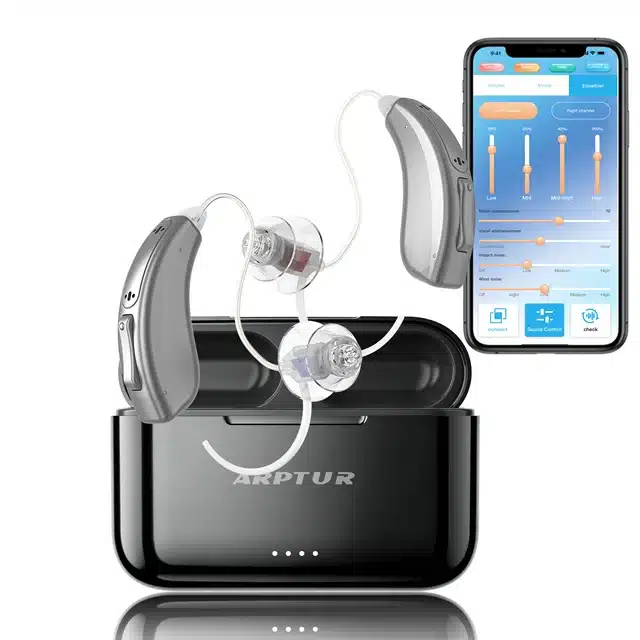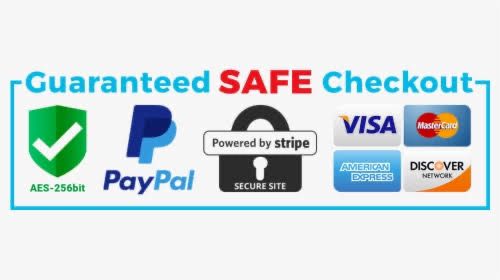Best Hearing Aid Store for Your Needs
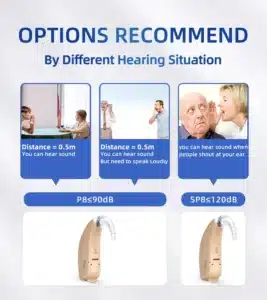
Hearing aids store:- Finding the right hearing aid store can make a world of difference in our journey to better hearing. We understand that navigating the world of hearing aids can be overwhelming, especially with the variety of options available today. From well-known brands like Oticon, Phonak, and Starkey to the latest innovations in hearing technology, it’s crucial to find a store that caters to our unique needs and preferences.
In this article, we’ll explore the key aspects to consider when choosing a hearing aid store. We’ll dive into the different types of stores available, discuss the essential features of a reliable provider, and compare in-store and online purchasing options. Additionally, we’ll share tips on how to get the most value from our chosen hearing aid store, covering everything from hearing aid fitting and accessories to maintenance and care. By the end, we’ll be better equipped to make an informed decision and find the best hearing aid store to meet our needs.
Understanding Different Types of Hearing Aid Stores
Hearing aids store:- We have various options when it comes to purchasing hearing aids. Traditional clinics and audiology offices offer name-brand devices with full features and professional fitting services [1]. These stores provide comprehensive care, including hearing tests, custom programming, and ongoing support.
Over-the-counter (OTC) hearing aids are now available for adults with mild to moderate hearing loss [2]. These can be bought directly from pharmacies, stores, and online retailers without a prescription or professional fitting.
Big box stores like Costco and Walmart also sell hearing aids, often at lower prices. However, they may have a limited selection of brands and older technology compared to specialized clinics [3].
Online retailers offer convenience and potential cost savings, but may lack personalized fitting and aftercare services [1]. It’s crucial to consider factors like professional expertise, device quality, and ongoing support when choosing where to buy hearing aids.
Key Features of a Reliable Hearing Aid Store
When we’re looking for a hearing aid store, we want to ensure it meets our specific needs. A reliable store should offer customized fittings, which are crucial for optimal hearing aid performance [4]. These fittings help us find the right devices for our level of hearing loss, whether it’s in-the-ear (ITE) or behind-the-ear (BTE) models [5].
We should also look for stores with qualified professionals. Audiologists, who have extensive training and education, can diagnose and treat various hearing disorders [6]. They can provide comprehensive care, including hearing tests, custom programming, and ongoing support [1].
Another key feature is the availability of a wide range of hearing aid brands and models. This allows us to choose from various options that suit our preferences and budget [7]. Additionally, we should consider stores that offer trial periods and warranties, ensuring we’re satisfied with our purchase [8].
Comparing In-Store vs. Online Hearing Aid Purchases
We’ve found that both in-store and online hearing aid purchases have their merits. In-store purchases offer professional guidance, customized fittings, and ongoing support [9]. Audiologists can conduct thorough assessments and recommend suitable options based on our specific needs [10]. Online purchases, however, provide convenience and potentially lower prices [11]. We can browse a wide range of options from home and access detailed product information [11]. It’s crucial to consider factors like professional expertise, device quality, and ongoing support when choosing where to buy hearing aids [1].
Maximizing Value from Your Hearing Aid Store
Hearing aids store:- To get the most out of our hearing aid store, we need to understand our warranty coverage. Most manufacturers offer at least a one-year comprehensive warranty, with some extending up to three years for more advanced devices [12]. This coverage typically includes loss, damage, and repairs. We should also consider extended warranties for long-term protection [12].
Regular check-ups are crucial. These appointments allow us to address any changes in our hearing needs and ensure our devices are functioning optimally [13]. We should also stay informed about technological advancements, as new features like Bluetooth connectivity and AI integration can significantly enhance our hearing experience [13].
Lastly, we must prioritize ongoing care and maintenance of our devices. Regular cleaning and upkeep not only extend the life of our hearing aids but also ensure consistent performance [13].
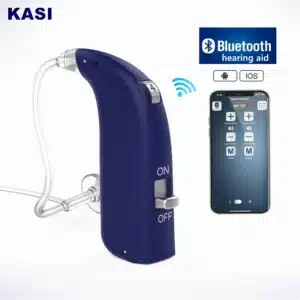
Can I just buy a hearing aid without a test?
While it’s possible to purchase hearing aids without a formal hearing test, it’s not recommended. Here’s why:
- Proper Fit and Function: A hearing test helps determine the type and extent of hearing loss, which is crucial for selecting a hearing aid that meets your specific needs. Without this assessment, you might end up with a device that doesn’t address your hearing issues effectively.
- Personalization: Hearing aids often need to be adjusted to match your hearing loss profile. A hearing test allows for personalized adjustments to ensure optimal performance and comfort.
- Health and Safety: Hearing aids that aren’t suited to your level of hearing loss or that aren’t properly fitted can potentially cause discomfort or even worsen your hearing.
- Insurance and Warranty: Some insurance plans and warranties require a hearing test as part of the purchase process. If you skip this step, you might face challenges with coverage or support.
- Professional Advice: Audiologists and hearing care professionals can provide valuable advice on the best hearing aids for your lifestyle and needs, ensuring you get a device that works well in various situations.
How much should I expect to pay for a hearing aid?
Hearing aids store:- The cost of hearing aids can vary widely based on several factors, including the type of device, its features, the brand, and where you purchase it. Here’s a general breakdown:
- Basic Hearing Aids: These typically cost between $1,000 and $2,000 per device. They may have fewer features and less advanced technology.
- Mid-Range Hearing Aids: Expect to pay between $2,000 and $4,000 per device. These often come with more features, such as better sound quality, noise reduction, and connectivity options.
- High-End Hearing Aids: Premium models can range from $4,000 to $6,000 or more per device. They usually offer advanced technology, including enhanced sound processing, connectivity with smartphones, and customization options.
- Additional Costs: Consider potential additional costs such as:
- Fitting and Adjustment Fees: Some stores or audiologists may charge for fitting and follow-up adjustments.
- Maintenance and Batteries: Regular maintenance and replacement batteries can add to the overall cost.
- Hearing Tests: Some clinics include the cost of hearing tests with the purchase of hearing aids, while others may charge separately.
- Insurance and Financing: Check if your health insurance covers any part of the cost of hearing aids. Some plans provide partial reimbursement or coverage. Additionally, many retailers offer financing options to help spread the cost.
It’s always a good idea to compare prices and services at different stores and consider the overall value, including aftercare and support, when making your decision.
Can I buy a hearing aid off the shelf?
Hearing aids store: Yes, you can buy hearing aids off the shelf, but there are important considerations to keep in mind:
- Over-the-Counter (OTC) Hearing Aids: These are available at some pharmacies, retail stores, and online. OTC hearing aids are typically designed for individuals with mild to moderate hearing loss and are less expensive than custom-fitted devices. They often come with basic features and may not offer the level of customization or advanced technology found in prescription models.
- Hearing Aids Online: You can also purchase hearing aids from online retailers. These may include both OTC and more advanced models. Be sure to check the return policy and warranty details, as well as whether the retailer provides support for fitting and adjustments.
- Considerations for OTC Hearing Aids:
- Hearing Test: OTC hearing aids are not typically sold with a hearing test or professional fitting. It’s advisable to have your hearing evaluated by a professional to ensure you select a device that meets your specific needs.
- Customization: OTC models may lack the ability to be fine-tuned to your individual hearing loss, which can affect their effectiveness and comfort.
- Professional Support: Without professional guidance, you might miss out on personalized adjustments and ongoing support, which can impact the overall benefit of the hearing aid.
What to do before buying a hearing aid?
Hearing aids store: Before purchasing a hearing aid, it’s important to take several steps to ensure you select the right device for your needs and get the most out of your investment. Here’s a comprehensive guide to help you through the process:
1. Assess Your Hearing Needs
- Self-Evaluation: Consider your hearing difficulties and how they impact your daily life. Are you having trouble with conversations, background noise, or understanding speech?
2. Schedule a Hearing Evaluation
- Professional Hearing Test: Visit an audiologist or an ENT specialist for a comprehensive hearing test. This will determine the type and extent of your hearing loss and help identify the most suitable hearing aid.
3. Research Hearing Aid Options
- Types of Hearing Aids: Learn about different types, such as behind-the-ear (BTE), in-the-ear (ITE), and completely-in-the-canal (CIC) hearing aids.
- Features and Technology: Consider features like noise reduction, Bluetooth connectivity, rechargeable batteries, and customizable sound settings.
4. Consider Your Lifestyle and Preferences
- Activity Level: Think about how active you are and choose a hearing aid that suits your lifestyle. For example, some models are more durable or better suited for active environments.
- Comfort and Aesthetics: Choose a style that you find comfortable and that matches your preference for visibility.
5. Set a Budget
- Understand Costs: Determine how much you’re willing to spend. Remember that costs include not only the hearing aid itself but also potential fees for fittings, follow-up appointments, and maintenance.
- Insurance and Financing: Check if your health insurance covers hearing aids or if there are financing options available to help with the cost.
6. Compare Providers and Products
- Professional vs. Retail: Decide whether to purchase from a professional audiologist or an over-the-counter retailer. Each has its own benefits and drawbacks.
- Read Reviews: Look at customer reviews and ratings for both hearing aids and providers to gauge quality and customer satisfaction.
7. Test and Trial
- In-Store Trial: If possible, try different hearing aids in-store to see which feels most comfortable and provides the best sound quality.
- Trial Period: Many hearing aids come with a trial period. Use this time to test the device in various environments and see if it meets your needs.
8. Understand the Warranty and Return Policy
- Warranty: Check the warranty details to understand what is covered and for how long. Warranties often cover repairs, adjustments, and sometimes loss or damage.
- Return Policy: Ensure there’s a clear return policy in case the hearing aid doesn’t work out for you.
9. Plan for Follow-Up Care
- Follow-Up Appointments: Schedule follow-up visits with your audiologist or hearing aid provider to adjust settings, get advice, and address any issues.
- Maintenance: Learn how to care for and maintain your hearing aids to ensure their longevity and optimal performance.
10. Ask Questions
- Device Functionality: Ask about the hearing aid’s features, battery life, and how to operate it effectively.
- Support Services: Inquire about the availability of ongoing support, such as adjustments, repairs, and replacement services.
By taking these steps, you’ll be better equipped to choose a hearing aid that enhances your hearing experience and fits your lifestyle.
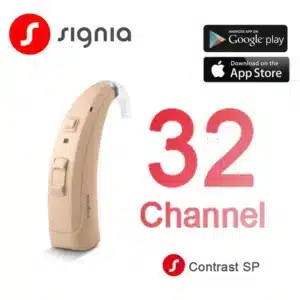
Hearing Aids: Medical vs. Retail
Hearing aids store: When it comes to purchasing hearing aids, you have two main routes: medical (professional audiological services) and retail (over-the-counter or online stores). Each approach has its own advantages and considerations.
Medical (Professional Audiological Services)
Pros:
- Comprehensive Hearing Evaluation:
- A professional audiologist or ENT specialist performs a detailed hearing assessment to determine the exact nature and extent of your hearing loss.
- Personalized Fit and Adjustment:
- Audiologists provide custom fittings and fine-tune hearing aids to suit your specific hearing needs and preferences. They also make adjustments over time as needed.
- Professional Advice:
- You receive expert recommendations on the best type of hearing aid for your condition, lifestyle, and budget.
- Ongoing Support:
- Professionals offer follow-up care, including troubleshooting, maintenance, and adjustments to ensure the hearing aids work optimally.
- Hearing Aid Options:
- Access to a wider range of advanced and customized hearing aids, including those with more sophisticated technology and features.
- Insurance and Warranty Handling:
- Assistance with insurance claims and warranty services is often available.
Cons:
- Higher Costs:
- Professional services often come with a higher price tag due to the added value of personalized care and advanced technology.
- Potential for Longer Wait Times:
- The process may take longer, from the initial assessment to receiving the final product and fitting.
Retail (Over-the-Counter or Online Stores)
Pros:
- Lower Costs:
- Generally, retail and OTC hearing aids are more affordable, as they bypass some of the professional service fees.
- Convenience:
- Easier to purchase, especially online, and often quicker to obtain without needing appointments.
- Variety and Accessibility:
- A range of options is available, and you can often read user reviews and compare different models.
Cons:
- Lack of Personalization:
- OTC and retail hearing aids may not be customized for your specific hearing loss. You might miss out on personalized fitting and adjustments.
- Limited Support:
- After-purchase support may be minimal. You might need to handle adjustments and troubleshooting on your own or seek help from third parties.
- Risk of Ineffective Solutions:
- Without a professional evaluation, there’s a risk that the hearing aids may not effectively address your hearing needs, leading to potential discomfort or inadequate performance.
- Insurance and Warranty Issues:
- Handling returns, warranties, and insurance claims can be more challenging with OTC and retail purchases.
Which Option is Right for You?
- If you have complex hearing needs or want a highly customized solution, working with a professional audiologist or hearing care provider is generally the better choice. They can provide personalized service, comprehensive evaluations, and ongoing support.
- If you have mild to moderate hearing loss and are looking for a more cost-effective solution, OTC hearing aids from retail or online stores might be a suitable option. Just be prepared to manage the device’s settings and maintenance yourself, or consult a professional if needed.
Ultimately, the best choice depends on your hearing needs, budget, and preference for professional support versus convenience and cost.
Walmart hearing aids in store
Walmart offers hearing aids in their stores through the Hearing Aid Center, which is often located within larger Walmart locations. Here’s what you need to know about buying hearing aids at Walmart:
What Walmart Offers
- Hearing Aid Models:
- Over-the-Counter (OTC) Hearing Aids: Walmart typically carries a range of OTC hearing aids designed for mild to moderate hearing loss. These are generally more affordable and do not require a prescription.
- Prescription Hearing Aids: Some locations may offer prescription hearing aids, which require a hearing test and a fitting by a professional.
- Services Provided:
- Hearing Tests: Walmart Hearing Aid Centers often provide free or low-cost hearing tests to determine your level of hearing loss. This can help you choose the most suitable hearing aid.
- Fitting and Adjustment: Professional staff can assist with fitting and adjusting hearing aids to ensure proper comfort and functionality.
- Support and Maintenance: Walmart offers support services including repairs, adjustments, and battery replacement.
- Brands:
- Walmart typically carries hearing aids from well-known brands such as HearingLife, Great Value, and sometimes other national brands depending on the location.
Steps to Purchase Hearing Aids at Walmart
- Visit the Hearing Aid Center:
- Locate the Hearing Aid Center at a Walmart near you. You can find this information on Walmart’s website or by calling the store directly.
- Get a Hearing Test:
- Schedule a free or low-cost hearing test to assess your hearing needs. This will help determine the right type of hearing aid for you.
- Consult with a Professional:
- Speak with a hearing aid specialist at the store who can guide you through the options, recommend suitable models, and assist with fitting.
- Explore Models and Features:
- Compare different hearing aids available at Walmart, considering features such as battery life, ease of use, and any additional functionalities.
- Understand Pricing and Warranty:
- Review the pricing, warranty, and return policies for the hearing aids you’re interested in. Make sure you understand what is covered under warranty and the store’s return policy in case you need to make changes.
- Follow Up:
- Schedule follow-up appointments for adjustments and maintenance if needed. Proper care and regular adjustments can help ensure your hearing aids remain effective and comfortable.
Advantages of Buying at Walmart
- Convenience: Walmart offers a convenient option for purchasing hearing aids as it’s likely to be close to your home.
- Cost: The prices at Walmart may be more competitive compared to specialized hearing aid stores.
- One-Stop Shop: You can combine your hearing aid purchase with other shopping needs, which can be more convenient. …Like in Hearing aid walmart store
Considerations
- Limited Selection: The range of hearing aids and accessories might be more limited compared to specialized hearing aid stores.
- Expertise: While Walmart staff are trained to assist with hearing aids, specialized hearing aid stores or audiologists might offer more personalized and comprehensive services. …Hearing aid walmart
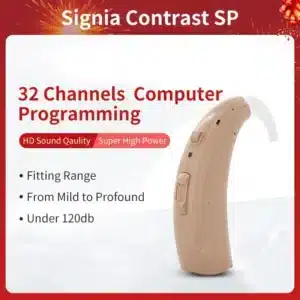
Costco hearing aid store
Hearing aids store:- Costco is known for its competitive pricing and high-quality products, and their hearing aid centers are no exception. Here’s what you should know about purchasing hearing aids at Costco:
Costco Hearing Aid Centers
What Costco Offers
- Hearing Aid Brands:
- Costco’s hearing aid centers typically offer a range of brands including Kirkland Signature (Costco’s private label), Phonak, and sometimes other major brands. The Kirkland Signature hearing aids are often noted for their high quality and value.
- Types of Hearing Aids:
- Behind-the-Ear (BTE): Available in various models, including those with rechargeable batteries and advanced features.
- In-the-Ear (ITE): Includes models designed for more discreet wear and comfort.
- Services Provided:
- Hearing Tests: Costco offers free hearing tests to evaluate your hearing loss and determine the most suitable hearing aid.
- Fitting and Adjustment: Professional staff provide fitting services, customize settings, and make adjustments to ensure optimal performance.
- Follow-Up Support: Ongoing support includes additional adjustments, maintenance, and repairs.
- Pricing:
- Costco is known for offering hearing aids at a lower price compared to many other retailers. Prices typically range from $1,000 to $2,000 per device, which includes the cost of the hearing aid and professional services. This price is often significantly lower than that of similar devices sold elsewhere.
- Warranty and Return Policy:
- Hearing aids purchased at Costco usually come with a comprehensive warranty and a generous return policy. Be sure to ask about the details of the warranty and return options when you make your purchase.
Steps to Purchase Hearing Aids at Costco
- Locate a Hearing Aid Center:
- Find a Costco location with a hearing aid center. You can check Costco’s website or call the store for information on availability and services.
- Schedule a Hearing Test:
- Make an appointment for a free hearing test. This will help determine the extent of your hearing loss and guide the selection of the appropriate hearing aid.
- Consult with a Hearing Aid Specialist:
- Meet with a hearing aid specialist at Costco to discuss your hearing needs, review different hearing aid options, and get recommendations based on your hearing test results.
- Try Different Models:
- Costco allows you to try various hearing aid models to find the one that best suits your needs. Test different options for comfort and sound quality.
- Understand Pricing and Services:
- Review the costs, warranty details, and any additional services included in the purchase. Make sure you understand what is covered under the warranty and the return policy.
- Follow-Up Care:
- Schedule follow-up appointments for adjustments and maintenance as needed. Proper follow-up ensures that your hearing aids continue to perform well and remain comfortable.
Advantages of Buying at Costco
- Cost Savings: Competitive pricing and high-quality products often make Costco an appealing option for hearing aids.
- Quality and Value: The Kirkland Signature brand, in particular, is known for offering good quality at a lower price.
- Comprehensive Service: Costco’s hearing aid centers provide a range of services, including free hearing tests and professional fitting.
Considerations
- Membership Requirement: You need to be a Costco member to access their hearing aid centers and make purchases.
- Product Range: While Costco offers high-quality options, their selection might be more limited compared to specialized hearing aid stores or audiologists.
Conclusion
Choosing the right hearing aid store has a significant impact on our journey to better hearing. From traditional clinics to online retailers, we have a range of options to consider. The key is to find a store that offers customized fittings, qualified professionals, and a wide selection of hearing aid brands. It’s also crucial to weigh the pros and cons of in-store versus online purchases, keeping in mind factors like professional expertise, device quality, and ongoing support.
To get the most value from our chosen hearing aid store, it’s essential to understand warranty coverage, schedule regular check-ups, and stay informed about new technologies. Proper care and maintenance of our devices are also crucial to ensure consistent performance and longevity. By keeping these factors in mind, we can make an informed decision and find a hearing aid store that meets our unique needs, ultimately improving our quality of life through better hearing.
FAQs
What is the top-rated hearing aid available today?
The Jabra Enhance is considered the best overall hearing aid for 2024. It offers high-quality, over-the-counter devices and exceptional ongoing customer support, including access to an audiology team when you purchase the premium package.
Should I purchase my hearing aid through an audiologist?
Hearing aids store:- It is advisable to get a hearing aid through a reputable audiologist. An audiologist will evaluate your hearing, assist in selecting the most suitable hearing aid, and customize the device to your specific needs. Using two hearing aids is often recommended if you have hearing loss in both ears.
Which hearing aids are recommended for the best clarity of speech?
Hearing aids store:- The Horizon Go IX and Horizon Mini IX are among the top hearing aids for speech focus and clarity. Both models are part of the exclusive Horizon line offered by hear.com.
Which type of hearing aid is more effective, behind-the-ear or in-the-ear models?
Hearing aids store:- While in-canal hearing aids are more discreet, behind-the-ear hearing aids provide a broader range of hearing amplification. They are generally more versatile, offering enhanced options for hearing in noisy environments, connecting to smartphones, or streaming audio directly from your television.
Facebook Page
X Page
Instagram Page
